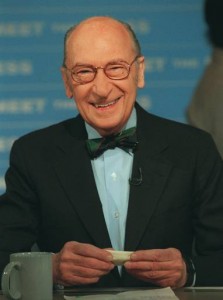By Landon Dowdy
NBC News correspondent Irving R. Levine said it best when he said, “Once a news junkie, always a news junkie.”
His dedication to his craft drove him to read three or four newspapers every morning and eventually led him to become the man responsible for “essentially creating economics reporting,” said Lynn University President Kevin Ross.
Time magazine agreed when it called him the “pioneer” of reporting economics on television.
Balding head, piercing blue eyes, and a signature bow tie added character to his slow-paced delivery and gave him a recognizable presence in television news for more than four decades. Former co-worker and Lynn University professor Denise Belafonte recalled Levine as “brilliant and witty… and he just silenced the room.”
Levine was born on Aug. 6, 1922, in Pawtucket, R. I., just outside of Providence and stayed local for college where he attended Brown University. He landed his first job in 1940 working for the Providence Journal as an obituary writer.
Levine had bigger aspirations as a journalist though, and his goal was to be abroad. Levine joined the Army during World War II as a photographer, which allowed him to travel to the Philippines and Japan. Levine still had his sights set on becoming a foreign correspondent.
After leaving the Army, Levine decided to hone in on his journalism, earning a graduate degree from Columbia University’s Graduate School of Journalism.
Following graduate school, Levine started working as a correspondent on the foreign desk for the International News Service. Levine said, “I had wanted to be a foreign correspondent since high school but INS was not the most generous outfit. The only way to go overseas was to pay your own passage.”
In 1949 at the beginning of the Cold War, Levine traveled to Paris by way of the Queen Mary to be the only INS correspondent in Vienna. When the United Nations sent troops to Korea in 1950, Levine wanted to cover the war and requested a transfer volunteering to cover it.
He began freelancing for NBC from there and nabbed the honor of becoming the first network reporter to be accredited by the Soviet Union in 1955. NBC went on to hire Levine full-time and sent him back to Europe traveling to more than two-dozen countries including Korea, Russia, Vietnam, Algeria, Poland, South Africa, Japan, Italy and England.
At the time NBC paid $50 per piece. Levine, being the witty man he was, remarked, “I always thought they looked at the $50 a broadcast and decided it would be cheaper to hire me full time. And that’s how I went to work for NBC.”
Levine wanted to cover the State Department, but NBC News had different plans for him. “It was a barren time,” explained Levine. “Producers just weren’t interested in those stories.” Instead, producers asked him to cover business and economics. It seems they had an eye for his skill, as he went on to be the first network correspondent to cover economics full time.
Former television news producer and Syracuse University professor Robert Lissit stated, “He’s grabbed so much air time over the years that a CBS News president once said all NBC had for correspondents was a bunch of guys named Irving. In response, Levine’s colleagues made up a button stating, ‘Irving, NBC News.’”
It was the height of economic excitement in 1970 with rising unemployment, inflation and business troubles that gave Levine much to report on. The problem was that the average viewer had trouble understanding heavy economic talk and issues.
With the challenge, Levine shined in his ability to break down the reports in a way that not only was understandable to the viewers but also taught his audience economics.
NBC Nightly News’ Washington producer at the time, Christie Basham, explained, “I told him if he could make me understand them, the viewer would too. And he did. He taught me economics.”
Forbes Editor-in-Chief Steve Forbes noted Levine “showed others how to take the economy and make it understandable and accessible to a wide audience… Levine stood out because of his ability to communicate and relay the essence of complex subjects.”
Levine was well known for being a stickler by using his name as “Irving R. Levine” in his sign-off even against the wishes of NBC producers who thought it was too long and added an unnecessary couple of seconds to the newscast. Levine recalled the producers “finally suggested I drop the R in my sign-off, Irving R. Levine. I held my ground. “’No,’ I said, ‘I’d rather drop the B in NBC.’”
Levine’s quick-witted humor is remembered fondly at Lynn University in Boca Raton, Fla., where he went on to become the dean of the College of International Communications after he retired from NBC in 1995.
Current university President Kevin Ross explained that his father met Levine on a cruise to Europe at a time when he was planning to make a move back to his roots of Brown University. Ross Sr., then Lynn University president, invited him down to Lynn and persuaded him to join the university. It was at that time Levine dropped the R and insisted on becoming Dean Levine.
Ross told of “his wicked sense of humor, that was border-line inappropriate, but hilarious” and in a commencement speech to the graduating class where he advised students that “every year Mr. Forbes publishes a list of the 500 richest people in the world. After you wake up in the morning, look at the list. If you’re not on it, go to work.”
Levine was a hard-working visionary and a teacher to all. He went on to write three books about life in the USSR – all best sellers. He was a model public speaker that knew everyone, and everyone knew him. In the wise words of Levine himself, “It’s not who you know; it’s whom you know.”
Levine died March 27, 2009, at the age of 86 of prostate complications in Washington, D.C.
